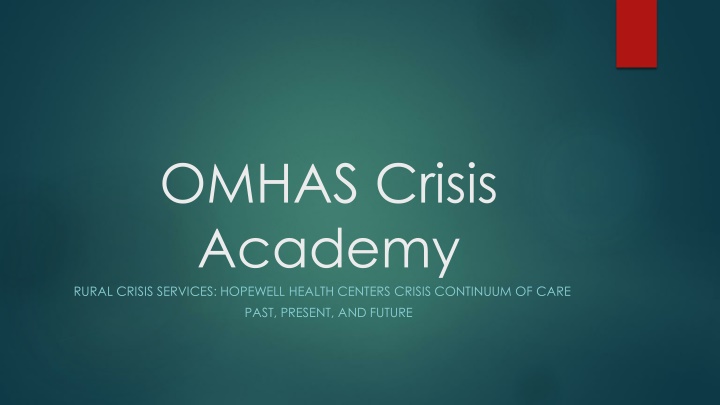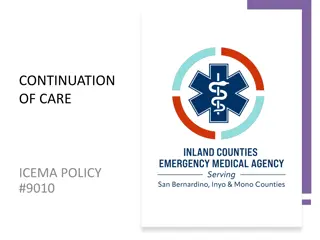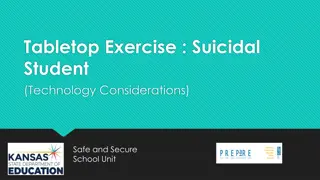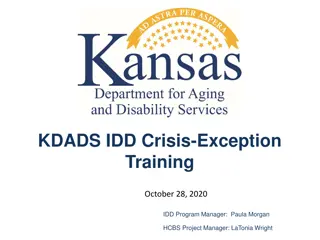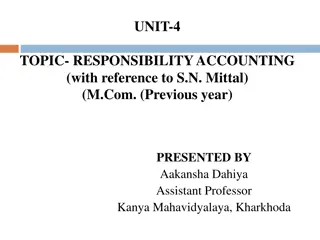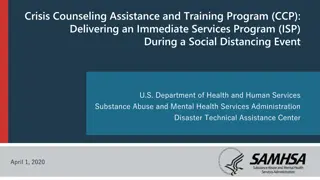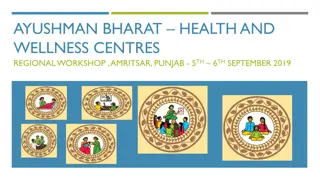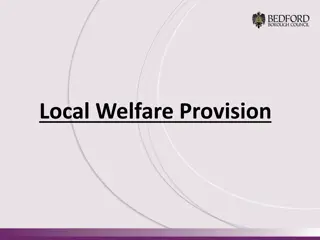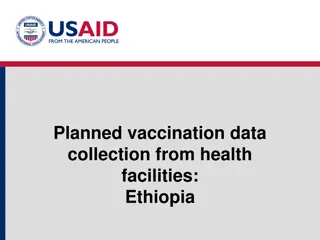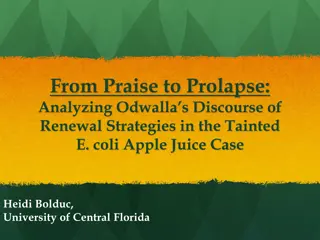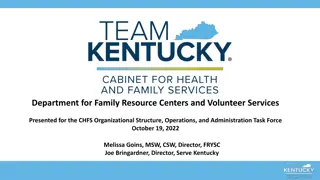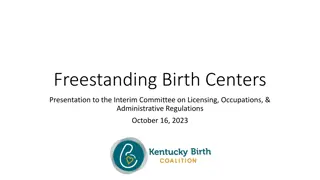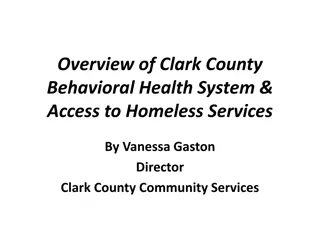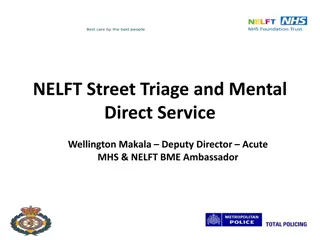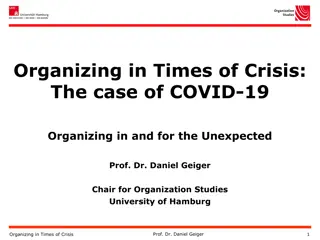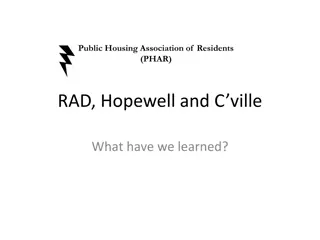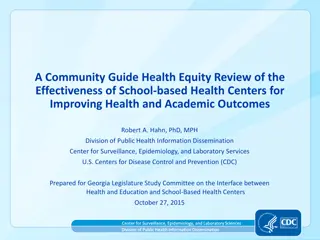Evolution of Crisis Services at Hopewell Health Centers
Crisis services at Hopewell Health Centers in the Athens/Hocking/Vinton counties have evolved significantly over the past decade. The introduction of new protocols, increased pre-screening staff, and collaboration with various healthcare facilities have led to better access and care for individuals in crisis situations.
Download Presentation

Please find below an Image/Link to download the presentation.
The content on the website is provided AS IS for your information and personal use only. It may not be sold, licensed, or shared on other websites without obtaining consent from the author.If you encounter any issues during the download, it is possible that the publisher has removed the file from their server.
You are allowed to download the files provided on this website for personal or commercial use, subject to the condition that they are used lawfully. All files are the property of their respective owners.
The content on the website is provided AS IS for your information and personal use only. It may not be sold, licensed, or shared on other websites without obtaining consent from the author.
E N D
Presentation Transcript
OMHAS Crisis Academy RURAL CRISIS SERVICES: HOPEWELL HEALTH CENTERS CRISIS CONTINUUM OF CARE PAST, PRESENT, AND FUTURE
Hopewell Health Centers Crisis Team: Who We Are Crisis Services are provided in all counties (Athens/Hocking/Vinton and Gallia/Jackson/Meigs). Today s focus will be on what services are available in the Athens/Hocking/Vinton county area Continuum of Care Consisting of Crisis Hotline; Prescreening in Hospital ER and Inpatient Medical Units, Southeastern Ohio Regional Jail, and on-site at Hopewell Health Center Clinic in Athens; Crisis Stabilization Unit housed within Adam-Amanda Mental Health Rehabilitation Center Hospital Step-down Unit
How Things Used To Be Within the past 10-15 years, total number of prescreens were much less More availability of local inpatient beds at Appalachian Behavioral Healthcare Less focus on medical clearance One prescreener per 12 hour shift with one backup supervisor that could be contacted for questions. Minimal availability of Crisis Case Management CIT Training was in place, but cooperation and coordination with local law enforcement was a challenge at times CSU did not have programming or clinical staff Adam-Amanda MHRC step-down unit did not exist
So What Changed? The increase in dual diagnosis and belief that all individuals required medical clearance prior to prescreen and hospitalization led to all individuals being directed to O Bleness ER for medical clearance, and a significant amount of prescreens relocating to the ER Numbers of forensic status individuals in state hospitals decreased the availability of local inpatient beds, requiring many, if not most individuals to be sent 1 hour or further away for inpatient care Numbers of individuals in need of crisis services increased exponentially, requiring a change in the ways that Crisis Services engaged with and assisted individuals with access to care
The Current State of Affairs Increased amount of prescreeners, from one person on every 12 hours, to the current coverage status of 3-4 pre-screeners Monday through Friday from 9AM to 11 PM and two people covering Saturday and Sunday. In 2020, the crisis team completed 2,495 pre-screens. Pre-screens by location are as follows O bleness Memorial Hospital 1,663, Hocking Valley Hospital 299, Southeast Ohio Regional Jail 402, Hopewell Health Centers Athens Location 116 and Hopewell Health Centers Vinton Location 15. Collaboration with local law enforcement leading to Blue Slips, thus decreasing the amount of individuals with mental illness going to jail and increasing the amount of and availability of diversions to appropriate care, rather than to incarceration if not warranted Zero Suicide Initiative staff members engaging in follow up with individuals that are at risk of suicide but not hospitalized at the time of prescreen
Continued Current State of Affairs The Crisis Stabilization Unit (CSU) combined with the Adam-Amanda Mental Health Rehabilitation Center in late 2018 with improvement in services to now include: Clinical staffing: Therapist, Admissions/Discharge Coordinator, 2 CPST Providers, Peer Support Staff, and on-site RN. Weekly access to psychiatric appointments for Adam-Amanda residents. Mental Health Day Treatment Programming occurs daily. Length of Stay: for CSU, length of stay is up to 14 days; for Adam- Amanda MHRC, length of stay is up to 90 days. Clinical staff meet regularly to determine individual needs of residents, and put in place needed services Linkage: clients can be referred to Hopewell Health Centers Primary Care and Dental services, and can be referred out for specialty medical appointments. For Adam-Amanda residents, coordination with mental health providers in their area of residence allows for ease of transition back to home county
Importance of Training in Rural Areas Each point of entry into the mental health system of care needs to be aware of how to identify an individual in crisis, and how to assist with transition to specific crisis services as needed First Responders are often called to intervene in situations that involve individuals in crisis
Crisis Training at Hopewell Health Centers AMSR: Assessing and Managing Suicide Risk is a training that is offered by The Suicide Prevention Resource Center (sprc.org), and 200+ outpatient staff members at Hopewell Health Centers have been trained in this model, with additional trainings planned on an ongoing basis Non-clinical staff at Hopewell Health Centers are trained in QPR (Question, Persuade, Refer) by Zero Suicide staff, to ensure that all staff members are aware of how to recognize when someone is in crisis, and what to do once that determination is made
Crisis Training in Athens/Hocking/Vinton Counties CIT Training Annually Advanced CIT Courses DBMT: Disruptive Behavior Management
Challenges In This New Normal Challenges related to CoVid and implementation of telemedicine for assessments Getting pink slips to the location of the individual
Future Planning to Improve Crisis Continuum of Care Crisis Call Center: current hotline is working to become Lifeline certified in order to improve the quality of current hotline interventions as well as to prepare for the upcoming changes with 988 ; also planning to obtain software (iCarol) to improve tracking of data and ability to move forward with technological advances; all staff with receive increase in specific trainings related to call center and crisis interaction; hiring of a licensed Call Center Clinician to improve telephone triage of callers so that we can implement the next step
Mobile Crisis CAHOOTS! Model Crisis CPST Coordination with Private Hospitals to do non-ER Private Admissions Meet Clients Where They Are Decrease use of law enforcement in situations that could be safely managed by Crisis Team; decreased reliance on ER to house individuals in crisis needing prescreened; decreased costs to hospital and public health and safety organizations Improvement in quality of care; decreased stigma; decreased cost for clients; better ability to immediately link people in crisis to appropriate services; limit the amount of additional trauma for the individual that is already in crisis
Step-Down and Follow Up If individual is prescreened and not in need of hospitalization, they can be referred to the CSU, linked with outpatient services, or linked with community agencies that can intervene with environmental issues leading to crisis (homeless shelter, Job and Family Services, Social Security, etc) If prescreened and hospitalized, the individual can be referred for stepdown to Adam-Amanda MHRC, and linked with services if not already engaged with providers Zero Suicide Initiative staff and Crisis CPST provide telephone and on-site follow-up and linkage post-intervention to provide additional support and assistance
Take Aways Increased need and challenges with access to Crisis Services Coordination Training Ongoing relationship-building
Contact Information Chaz Canter, Clinical Coordinator of Crisis Services 90 Hospital Drive, Athens OH 45701 (740)592-3091 chaz.canter@hopewellhealth.org Margaret Sterling, Director of Adam-Amanda Mental Health Rehabilitation Center, and Connett Road Group Home 7976 Dairy Lane, Athens OH 45701 (740)592-2734 margaret.sterling@hopewellhealth.org
